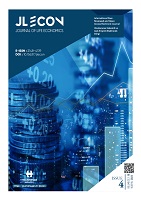How does globalization affect female employment? A Panel CS-ARDL analysis for transition countries
How does globalization affect female employment? A Panel CS-ARDL analysis for transition countries
Author(s): Merve Ertok Onurlu, Zamira Oskonbaeva, Ebru Çağlayan AkaySubject(s): Gender Studies, Labor relations, Globalization, Socio-Economic Research
Published by: Rating Academy
Keywords: Female Employment; Globalization; Transition Countries; Panel Data; CS-ARDL;
Summary/Abstract: Globalization is considered as a process of development for a country procured from the exchange of human capital, technology, and culture, along with many other economic, financial, and cultural factors at the international level. A wide range of studies in labor economics indicate that globalization and female employment are positively associated as job opportunities are enhanced for both males and females. However, others suggest that as opposed to males, once job opportunities increase, job market becomes more competitive in an unfavorable manner for females. This study intends to examine how globalization process affects female employment in transition countries over the period of 23 years from 1995 to 2017. To do this, a panel data consisting of a selected group of 21 transition countries are utilized in the analysis for which the Cross-Sectionally Augmented Autoregressive Distributed Lag model (CS-ARDL) is employed. Our results suggest that globalization is inversely related to female employment in the long run, which in turn suggests that globalization might create obstacles among females if policymakers do not provide any optimal policies to keep the labor market dynamics stable during the globalization process.
Journal: Journal of Life Economics
- Issue Year: 10/2023
- Issue No: 4
- Page Range: 301-313
- Page Count: 13
- Language: English

